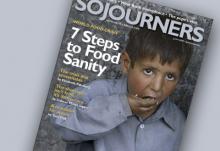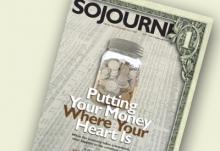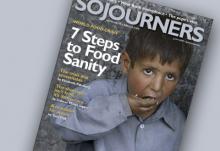Hunger

The dramatic rise in world food prices has pushed millions into poverty. Here's a look at 10 factors--from agrofuel production to rising meat and dairy consumption--that have contributed to this preventable crisis.
 Unconscionable: adjective
Unconscionable: adjective
1. not guided by conscience; unscrupulous.
2. not in accordance with what is just or reasonable: unconscionable behavior.
3. excessive; extortionate: an unconscionable profit.
I have had some "unconscionable" things on my mind a lot lately as I have been working with the 20-somethings who make up Orlando Food Not Bombs and University of [...]
“Without corn there is no country” is the slogan tens of thousands of small farmers in Mexico are using to protest the full implementation of the North American Free Trade Agreement (NA

They say: Whom do I wrong by keeping my property? What, tell me, is your property? Where did you find it and brought it to your life?
“Give us this day our daily bread.” The simplicity of the prayer that Jesus gave us can distract us from its wisdom and its challenge. At its heart is what Walter Brueggemann contends is God’s alternate food policy. The more ease and confidence we have in acquiring food, the easier it is to miss the radical edge that cuts through this prayer. As we appreciate this edge, our eyes open to the power of God’s economy of grace to feed the world with the food that genuinely delights and satisfies.
BREAD—or, generally, food—is a bundle of nutrients that, in the right quantities and combinations, are essential for life. But it is more than this, and reducing bread to these nutrients is the first temptation that Jesus faces. Jesus is hungry, and he has the power to alleviate this hunger by turning a stone to bread. Instead, he responds like this: “As it is written, ‘One does not live by bread alone, but by every word that comes from the mouth of God’” (Matthew 4:4). His choice is the opposite of that of the original humans, who, unheeding of the word of God, took and ate the fruit of the tree of the knowledge of good and evil because it was “good for food, a delight to the eyes, and desired to make one wise” (Genesis 3:6).
This separation of the bread that nourishes our bodies from the bread that is the word of God has in our time been reinforced by Karl Marx and by psychologist Abraham Maslow’s hierarchy of human needs. But in Christ we know that our physical, material choices are inextricably bound up with matters of the spirit. Every time we gather at the Lord’s table we enact this reality. It is real bread that we receive, yet in our eating we become the bread that we eat—the body of Christ, blessed and broken for all.
I biked past banners flapping in the breeze outside the Department of Health and Human Services: "Eat more fruits and vegetables!" they said. "Take the stairs instead of the elevator!" The next day I read about it in The Washington Post. Not only had HHS launched a Slim Down America campaign, but Secretary Tommy Thompson himself was on a diet - fruit for breakfast, salad for lunch, no more beers at The Dubliner after work. "It's difficult at the beginning," Thompson told the Post, "but every single one of us has got to take care of ourselves. We can't expect somebody else to do it for us."
From the low-carb craze to the organic food movement, it seems that the whole world is watching what it eats. My own Mennonite Church USA, so fond of cream sauces and jello salads, nevertheless rallied behind a recent health care statement that included among its objectives: "Our potlucks will no longer look like an invitation to a heart attack."
With 64 percent of Americans overweight, and obesity-related health care costs approaching $117 billion annually, calls to shape up and eat right might be warranted if they didn't obscure the fact that not everyone has access to the produce aisle. A 2000 USDA analysis found that low-income women are half as likely as wealthy women to eat salad or fruit on any given day. A 2002 study by the American Journal of Clinical Nutrition reported that they're also 50 percent more likely to be obese.
Brazil's President Luiz Inacio Lula da Silva met with Catholic bishops in May to discuss his Zero Hunger Program.
Be careful when you opt to wander off the beaten path; what you come across might change your direction altogether.
